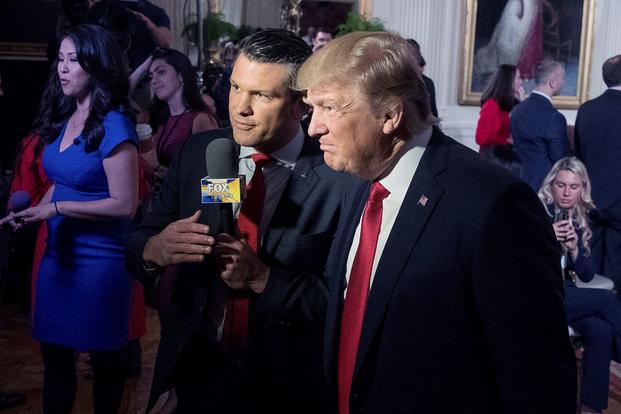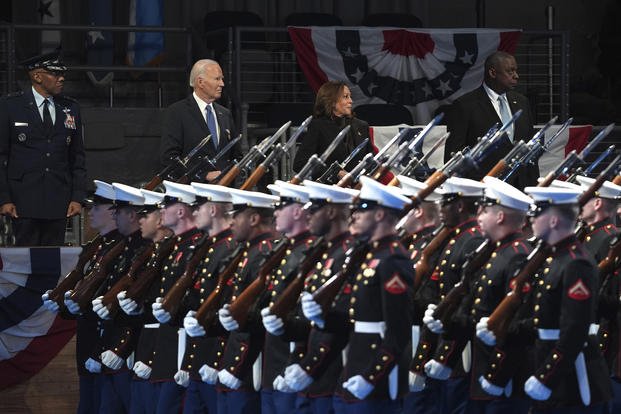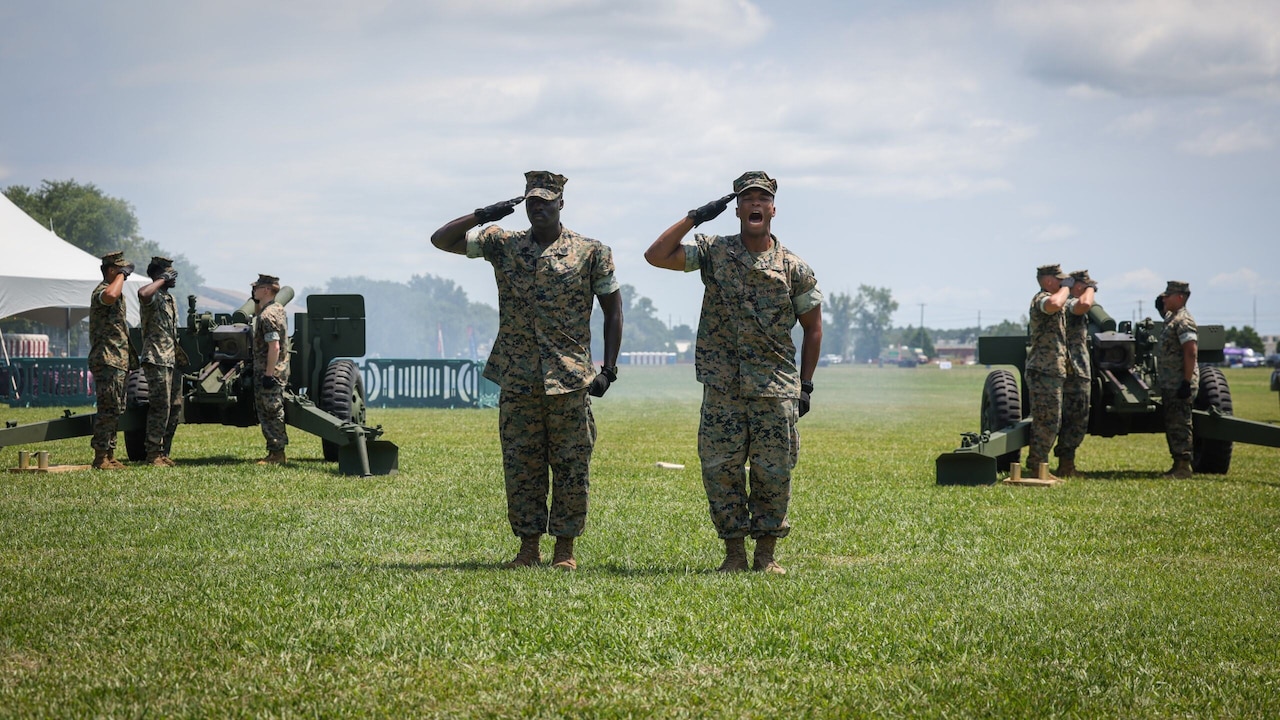Culture War Fights Poised to Take Lead in Trump's Pentagon Agenda

Fighting culture wars while prepping for any real wars.
That's the direction the next administration appears poised to take the Pentagon in after President-elect Donald Trump is sworn in Monday, based on defense secretary-nominee Pete Hegseth's confirmation hearing, Trump's promises on the campaign trail, and expectations from their GOP supporters.
Hegseth's testimony last week did not delve deeply into how the administration will confront some of the thorniest national security challenges facing the U.S., including competition with China and Russia, but some clues about that can be gleaned from the prospective defense secretary's written answers to policy questions posed by the Senate Armed Services Committee.
Read Next: Trump Names Former KC-135 Navigator, Spy Agency Official to Be Next Air Force Secretary[1]
There were also few indications of how the administration will handle the quality-of-life issues at the top of mind for service members, such as crumbling housing and inconsistent access to quality food.
What the hearing did make clear is that fighting cultural issues -- such as rolling back diversity efforts and relitigating COVID-19 vaccine mandate discharges -- will be a key theme of Trump and Hegseth's Pentagon, with Hegseth saying that Trump expects him to "restore the warrior ethos" at the department.
"I know the troops will rejoice," Hegseth contended when asked how the force would react to him and Trump removing a "woke yoke" from the military. "Because they want to focus on lethality and warfighting and get all the woke political prerogative, politically correct, social justice, political stuff out of the military."
It's a mission that Republican lawmakers have also said they expect Hegseth to focus on.
"Pete Hegseth is going to get the military back, instead of focusing on all the woke political crap that the Biden administration and Lloyd Austin and all of these -- the clown show at the Pentagon over the last four years," Sen. Jim Banks, R-Ind., said on Fox News the morning of Hegseth's hearing.
Throughout his presidential campaign, Trump vowed to reverse what he and other Republicans have characterized as "woke" military policies -- a term that has grown nebulous but which generally refers to policies aimed at making the military more welcoming to minorities, women and LGBTQ+ people.
Among the ways Trump indicated he would do that is firing military officers perceived to be woke or liberal. For example, his campaign platform vowed[2] to "get woke left-wing Democrats fired as soon as possible." Within days of Trump's election, his advisers reportedly already had drafted an executive order[3] to create a "warrior board" to recommend which top generals should be fired.
At his hearing, Hegseth all but confirmed that the beginning of his tenure will focus on scrutinizing the officer ranks.
"On day one, on Jan. 20, when President Trump is sworn in, he will issue a new set of lawful orders, and the leadership of our services will have an opportunity to follow those lawful orders or not. Those lawful orders will not be based on politics. They will be based on readiness, accountability, standards and lethality. That is the process by which leaders will be judged," Hegseth said when asked who will be held accountable for "wokeness." "And accountability is coming. Because everybody in this room knows, if you are a rifleman and you lose your rifle, they are throwing the book at you. But if you are a general who loses a war, you get a promotion. That is not going to happen in Donald Trump's Pentagon."
Asked specifically whether Joint Chiefs Chairman Gen. "CQ" Brown is on the chopping block, Hegseth repeated that "every single senior officer will be reviewed based on meritocracy, standards and lethality." Brown, the second Black chairman of the Joint Chiefs, has drawn the ire of conservatives for speaking positively about diversity efforts and for co-signing a memo when he was Air Force chief directing those in charge of officer commissionings to encourage a more diverse pool of candidates to apply[4].
For service members, one of their biggest concerns in recent years has been quality-of-life issues. For example, barracks have been found to be dilapidated and unsafe[5], and the services have struggled to feed their troops[6].
Hegseth and Trump have given little indication how they would fix those issues, nor was Hegseth asked about them in detail at his confirmation hearing.
A single question in the Senate Armed Services Committee's 75-page written policy questionnaire[7] for him asked what quality-of-life programs he would prioritize. Hegseth had no specific answer.
"If confirmed, I will conduct a review of existing quality-of-life and [morale, welfare and recreation] programs to identify those most essential to supporting military communities and maintaining the readiness of the force," he wrote.
Another major issue the Pentagon has faced in recent years is difficulty convincing young Americans to enlist. Addressing the military's recruiting[8] woes was part of what Hegseth said is included in his mandate to bring back a "warrior ethos" to the military. There too, he argued the "first and foremost" fix will be to "tear out" diversity initiatives.
Another way Hegseth promised to end "wokeness" included reinstating, with back pay[9] and at rank, troops who were discharged for refusing the COVID-19 vaccine when it was mandated from 2021 to 2023. Existing Pentagon policy allows those troops to rejoin if they want, but few have taken up the opportunity, officials have said[10].
And even while Hegseth walked back his previous categorical objection to women serving in combat, he said he would order a review of the standards women have to meet to qualify for combat jobs.
On other Pentagon policies that have been longtime targets of GOP lawmakers -- such as the policy that reimburses troops for travel related to reproductive health care, including abortion, and pro-LGBTQ+ policies -- Hegseth demurred.
"Our standard is whatever the president wants on this particular issue," Hegseth said when asked about the reproductive health care policy.
One area that is likely to be consistent across administrations is a focus on China as the primary so-called "pacing threat" faced by the U.S.
Asked on his policy questionnaire about the future of U.S. military forces in the Middle East, Europe and Africa, Hegseth promised to do a global force posture review, which is typical of new administrations. He said the same thing about the Indo-Pacific region, but also suggested he plans to "strengthen" the troop presence there and said he agrees with the assessment that China is America's top challenge.
"We need to accelerate efforts to strengthen our force posture and increase operational capabilities in the Indo-Pacific, given China's historic and rapid military buildup and the urgent need to reestablish deterrence," Hegseth wrote. "If confirmed, I will work to identify programs that could urgently strengthen deterrence in the Indo-Pacific."
Read Next: Hegseth Grilled About Women in Combat, Officer Purge in Confirmation Hearing[11]
© Copyright 2025 Military.com. All rights reserved. This article may not be republished, rebroadcast, rewritten or otherwise distributed without written permission. To reprint or license this article or any content from Military.com, please submit your request here[12].
It's Not Clear who Will Lead the Pentagon When Trump Takes Office. What Happens Then?

WASHINGTON (AP) — It is unclear who will take over at the Pentagon and the military services when the top leaders all step down[1] Monday as President-elect Donald Trump is sworn into office[2].
As of Friday, officials said they had not yet heard who will become the acting defense secretary. Officials said the military chiefs of the Army, Navy and Air Force were getting ready to step in as acting service secretaries — a rare move — because no civilians had been named or, in some cases, had turned down the opportunity.
As is customary, all current political appointees will step down as of noon EST on Inauguration Day, leaving hundreds of key defense posts open, including dozens that require Senate confirmation. In addition to the top job and all three service secretaries, all of their deputies and senior policy staff will leave.
The Senate Armed Services Committee is expected to vote Monday[3] on Trump's choice to head the Defense Department, Pete Hegseth, but the full Senate vote may not happen until days later. As a result someone from the Biden administration would have to take over temporarily.
For the service secretaries, officials said that while things could still change before the inauguration, the Trump team is eyeing Gen. Randy George, chief of staff of the Army, to be that service's temporary head. They said Gen. David Allvin, chief of staff of the Air Force, and Adm. Lisa Franchetti, the Navy chief, are aware they may have to step in if no civilian is named as acting secretary, and they are preparing for that possibility.
The officials, who spoke on condition of anonymity to discuss internal deliberations, said many senior Biden administration leaders are reluctant to serve in the incoming Trump administration because they are concerned about policy changes[4] they may be required to handle or enforce.
Usually, only people appointed by the president and confirmed by the Senate serve as a defense or service secretary, including in an acting capacity during a transition. Trump could pull a confirmed member of the Biden administration from another agency and put that person at the Pentagon.
Civilian control of the military is a key tenet, but under the law the military chiefs of the services — who are all Senate confirmed — can take over on a temporary basis. It's rare, but did happen more than 30 years ago.
Arnold Punaro, a retired Marine Corps Reserve two-star general, said that in 1993, Adm. Frank Kelso, who was Navy chief, was asked to serve as acting Navy secretary when Bill Clinton became president because civilian leaders did not step up.
“It doesn’t happen very often," said Punaro, who spent 14 years as a staff director on the Senate Armed Services Committee and has advised nominees through the confirmation process for decades. "Normally you don’t want the active-duty military serving in the civilian control positions. The practical reality is they are wearing both hats.”
The transition to a new secretary of defense has usually been an orderly process.
Four years ago, the deputy secretary of defense under Trump, David Norquist, became acting secretary for the two-day gap between the inauguration of Democratic President Joe Biden and the Senate vote to confirm Lloyd Austin as Pentagon chief.
President Barack Obama asked his Republican predecessor's defense secretary, Robert Gates, to stay on as his own Pentagon leader in 2009.
In 2017, Jim Mattis, Trump's pick to be secretary during his first term, was confirmed on Inauguration Day.
Various administrations have handled the handover differently. In many cases, people have been asked to stay on in a temporary role. In one recent instance, officials said, the comptrollers of the services stepped in as acting secretaries because a key job in the coming months is to put together the massive, complex budget and more often the money people are considered less political.
This year's gap is further complicated by the fact that Trump and Hegseth have both pledged ro rid the Defense Department of what they call “woke” generals — or those who have supported diversity programs. That raises the possibility that even as the administration struggles to fill its political appointee slots, it may also be carving holes in the military leadership structure that will have to be filled.
When Sen. Elissa Slotkin, D-Mich., asked Hegseth during his nomination hearing if he intended to fire the current Joint Chiefs chairman, Gen. CQ Brown, he answered, "Senator, every single senior officer will be reviewed based on meritocracy, standards, lethality, and commitment to lawful orders they will be given.”
Hegseth previously said that Brown should be fired. Conservative groups have compiled lists of generals they believe should be fired for supporting diversity programs. If Brown is fired, the vice chairman would take over until a new chairman is confirmed.
____
Associated Press writer Tara Copp contributed to this report.
© Copyright 2025 Associated Press. All rights reserved. This material may not be published, broadcast, rewritten or redistributed.
Marine Corps' Famous 'Oorah!' Mantra Started in a Submarine > U.S. Department of Defense > Story
 If a group of Marines is around, you'll likely hear an "Oorah!" at some point. It's a distinctive battle cry that's been used by the Marine Corps for decades, but its origin story isn't as well known. Those outside of the service might be surprised to
If a group of Marines is around, you'll likely hear an "Oorah!" at some point. It's a distinctive battle cry that's been used by the Marine Corps for decades, but its origin story isn't as well known. Those outside of the service might be surprised to